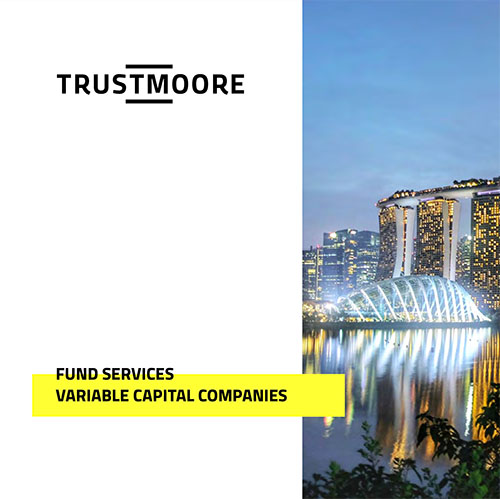
Singapore based fund managers can now apply for a grant of up to S$ 30,000 for establishing a Variable Capital Company (VCC).
Key Facts:
- Grants help reduce the cost of setting up a VCC.
- The scheme is straightforward to apply for and open to first time Qualifying Fund Managers.
- Grants can be used to co-fund legal, tax, fund administration, compliance and incorporation services.
The big picture:
- The Variable Capital Companies Grant Scheme (VCCGS) has been extended for two years.
- The Financial Sector Development Fund (FSDF) will co-fund 30% of qualifying expenses up to a maximum of S$30,000 per application.
- The VCC must be incorporated or redomiciled before 15 January 2025.
The Variable Capital Company (VCC) is an enhanced form of the Singapore-incorporated company, specifically tailored for investment funds and used for collective investment schemes (CIS). The legal entity can be formed as a single standalone fund or an umbrella fund with two or more sub-funds (each holding different assets).
The VCC Act was launched on 14 January 2020. It immediately enjoyed strong momentum, with more than 400 VCCs and 550 sub-funds registered in the first two years.
The VCC grant scheme, launched by the Monetary Authority of Singapore (MAS) under Singapore’s Financial Sector Development Fund, currently offers a grant of up to 30% of eligible expenses paid to Singapore based service providers.
Introduced to encourage the adoption of the VCC vehicle, it aimed to help these providers with VCC-related set-up costs (including legal, tax advisory, fund administration and regulatory compliance services). The grant is capped at $30,000 per application and limited to one VCC per qualifying fund manager. It also covers existing offshore investment funds that redomicile in Singapore.
The grant supports diversity in the industry, particularly in not precluding boutique-sized investment managers from participating in the VCC regime.
First time qualifying fund managers that have incorporated a VCC or have successfully redomiciled a foreign corporate entity to Singapore as a VCC and have obtained a notice of incorporation or transfer of registration from the Accounting and Corporate Regulatory Authority (ACRA).
The current grant scheme is valid until the 15th of January 2025.
There is still time to register a VCC or redomicile overseas investment funds to Singapore as a VCC and qualify for the grant scheme.
It takes around three weeks to set these vehicles up, and the name can be registered almost immediately (although timings may vary based on the type of capital markets services license the qualifying fund manager applies for).
Fund managers should formally submit their applications within three months from the date specified on the Notice of Incorporation issued by ACRA (for a newly incorporated VCC) or within three months from the date of ACRA's approval of the VCC's evidence of de-registration (for a foreign corporate entity redomiciled to Singapore as a VCC).
-
Segregation of sub-funds mitigates risk
a VCC can be established as a standalone fund or an umbrella fund with multiple sub-funds. In case of insolvency, each sub-fund must be wound up separately. Ring-fencing the assets and liabilities of each sub-fund in this way helps to safeguard investors.
-
Flexibility with dividend payouts
a VCC can pay dividends from the capital, which is not typically permissible in other corporate forms.
-
Heightened privacy
is essential for private funds because the constitution, financial statements, and the Register of Members (investors) cannot be made public.
-
Tax incentives
are extended to both the VCC and the Singapore fund manager Funds can apply for section 13O (Onshore Fund Tax Exemption Scheme), 13U (Enhanced Tier Fund Tax Exemption Scheme) and a tax exemption for venture capital funds (Section 13H scheme). Fund managers of VCC funds may apply for the Financial Sector Incentive Scheme for fund management (FSI-FM) and Fund Management Incentive (FMI) Scheme, which provides concessionary tax rates of 10% and 5%.
-
Flexibility of use
the VCC structure can be used for both open and closed ended fund types
-
Redomiciliation of foreign funds
foreign funds structured similarly to the VCC can be redomiciled to Singapore via a simple registration process under the Companies Act. This allows foreign funds to preserve their corporate history and identity while capitalizing on the VCC's benefits.
-
Cost efficiencies from economies of scale
the umbrella VCC structure allows sub funds to share a fund manager, investment team, board of directors, and service providers (i.e., fund administrator, counsel, custodian, auditor) so reduces statutory and regulatory reporting requirements, as well as ongoing operational expenses.
Singapore offers a variety of structures for investment funds, including limited partnerships, unit trusts, business trusts, and real estate investment trusts. Corporations are also commonly used as investment subsidiaries for fund investments; more than 70% of alternative funds in Singapore are corporate form funds domiciled in foreign locations.
But there are limitations to each of these fund structures, including:
- investor transparency issues
- restrictions on dividend payout from capital
- a lack of access to certain tax treaties that Singapore has in place.
Trustmoore has a strong presence in Singapore, having helped our domiciled and nondomiciled clients with all corporate structures since 2005.
As fund administrators, we are responsible for the independent valuation of the fund, including the calculation of the net asset value (NAV), subscription and redemption prices, and remuneration to the fund manager via management and performance fees. Typically, we also take on the role of a transfer agent. Key functions include maintaining a record of fund interest ownership, processing the fund's subscriptions and redemptions, distributing dividends, and preparing capital account statements, among other corporate actions.
We are independent of any bank, lawyer or accounting firm, so we act as independent advisers who can give their full attention to setting up and managing your fund and corporate structures in Singapore.
As well as assisting and advising you on incorporating a VCC in Singapore, we can assess the eligibility of your fund to apply for a VCC grant and the plausibility of achieving it.




